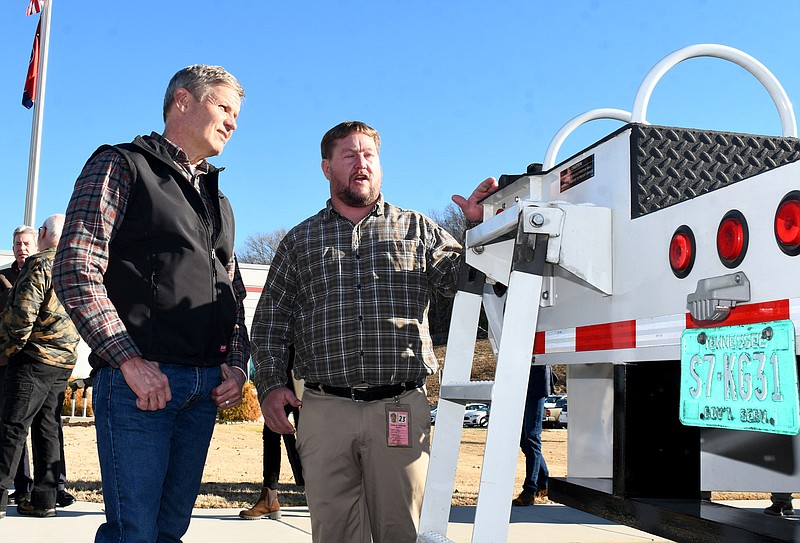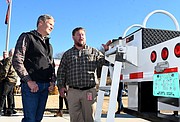Gov. Bill Lee stopped by the Tennessee Department of Transportation's Chattanooga facility Friday to rally support for his infrastructure plans to address $30 billion in transportation needs for a highway system he says is lagging.
Lee's plan is dubbed the Transportation Modernization Act of 2023, and his visits to TDOT facilities across the state in recent days are designed to gain momentum for it preceding the General Assembly's first day in session Tuesday.
"The condition of our roads and the ability for people to drive from one place to another is a daily impact on their families," Lee said Friday before an audience of state employees and media at a news conference at TDOT's offices on Volkswagen Drive. "We've got some of the best roads in the country. We maintain our roads well, and we do a really good job when you see what happens when we have storms."
Lee said Tennessee's transportation issues are among the state's greatest challenges, and Lee's plan seeks to accommodate the state's record growth, traffic congestion and address transportation needs in rural and urban communities across the state, he said.
"Part of my job is to think about what Tennessee's going to be like 20 years from now and do the things today that are going to make Tennessee where we want to be," Lee said.
(READ MORE: Public-private partnerships work their way into Tennessee state government)
Tennessee is attractive to businesses, has the highest-performing economy and lowest tax rate in the country, Lee said, but the revenue stream for infrastructure like roads, highways and bridges isn't sufficient to keep up with growth. He said rural interstates between the state's four largest metropolitan areas should have been widened years ago.
"We are really doing a good job of maintaining our roads and keeping up with what we've got, but we should be building roads much more rapidly than we are today," Lee said. "We are getting behind. We are behind -- we're way behind."
Lee said studies show there are $30 billion of new roads needed now, but while the $500,000 generated by state gas taxes each year supports maintenance of existing roads, it falls far short of long-term needs. Lee said plans don't include raising gas taxes but that drivers of electric vehicles should share the burden and his plan will seek answers for more parity between gas and electric vehicles.
Lee's plan includes ideas for teaming the private sector with government to lighten the financial burden on the state and loosen public funds for other transportation uses, he said.
"Tennessee is facing a critical juncture when it comes to transportation and mobility," Transportation Commissioner Butch Eley said in a news release on Lee's plan. "Our infrastructure investments will ensure that TDOT has the tools needed to quickly deliver and maintain quality roads so that Tennesseans and commerce can move across our state, all while saving taxpayer dollars."
According to the news release, proposals include:
-- Seeking public-private partnerships to allow private investment in new urban road infrastructure, which will allow the state to reserve funds for more rural priorities.
-- Plans for public-private partnerships to include exploring "choice lanes," which are optional, pay-to-use lanes on urban interstates to decrease congestion.
-- Expanding the alternative delivery model to save taxpayer dollars and deliver road projects more quickly.
"We are bringing forth some big ideas this year through the legislature that will require a change in law, but it's ideas that solve this problem," Lee said. "I also don't want to spend all the money on urban-centered projects at the expense of our rural communities."
Choice lanes would be built though a partnership with private companies, and drivers would pay the company for access, Lee said in an interview following his tour.
Lee refuses to call the cost of using choice lanes a "toll," but talked about the sources of some ideas.
"We looked at other states to get best practices. We traveled to Florida; we traveled to Texas to look at the way it's actually implemented," he said. "We'll take the best practices from those other states to create our own model. It'll be a transparent process when we contract in the public-private partnerships. We will have a competitive bid process to make sure we are getting the value for Tennesseans that they deserve."
People willing to pay to drive in the lanes will get where they're going faster, he said, and those who can't afford to travel in pay-to-use lanes would drive in lighter traffic in the existing lanes with the paying drivers out of the way.
"It's a win-win," Lee said.
The state's economic policies, high quality of life and ranking as one of the lowest-taxed states in the country makes Tennessee one of the most popular states for job creation -- experiencing a net gain of 137,100 jobs September 2021 to September 2022, according to TDOT. Population, meanwhile, has increased nearly 9% in the past decade.
TDOT officials said Tennessee's position as an artery of commerce necessitates more focus to make sure freight, visitors (who spent $24 billion in Tennessee in fiscal year 2021) and people traveling through the state get where they're going on time.
Lee's administration estimates Tennessee needs $26 billion over and above existing Improve Act funding to address urban and rural congestion.
The Improve ACT, signed by then-Gov. Bill Haslam in 2017, raised gas and diesel taxes by 6 cents and 10 cents, respectively, over a three-year period, as well as several fees, including a $5 increase on annual car registrations.
Secondly, new approaches to delivering projects are needed because, on average, it takes TDOT 15 years to deliver a project, with projects costing 40% over budget because it takes so long to get through the development phase, according to the state. With transportation needs outpacing the state's ability to deliver projects, TDOT officials are looking for solutions.
Meanwhile, TDOT continues to lose employees -- the agency has 3,600 employees -- and their salaries, which officials said are 10-15% below market level, are a main reason for their departure. Plans include efforts to increase salaries and move toward a team-based approach to allow faster, more efficient delivery of projects, according to the state's website.
Lee's plan had support from one important lawmaker on hand Friday.
House Transportation Committee Chairman Dan Howell, a Bradley County Republican, said he looks forward to the proposal's introduction in the upcoming legislative session.
"I'm very supportive of the governor's infrastructure initiative," Howell said following Friday's news conference. "He's been beating this drum that we ought to take a look at expanding the way we do our infrastructure. I think he and I are on the same page, and I look forward to working with him and his staff in getting this across the finish line in the General Assembly."
Contact Ben Benton at bbenton@timesfreepress.com or 423-757-6569.

